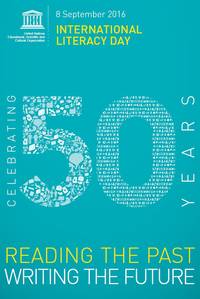“The world has changed since 1966 – but our determination to provide every woman and man with the skills, capacities, and opportunities to become everything they wish, in dignity and respect, remains as firm as ever. Literacy is a foundation to build a more sustainable future for all.”
-UNESCO Director-General
September 8th, 2016 marks the 50th anniversary of International Literacy Day. Established by UNESCO in 1966, International Literacy Day reflects the desire to increase global literacy rates, promote literacy as a tool for peace and positive change, and empower individuals to achieve their dreams. This year, UNESCO celebrates under the theme “Reading the Past, Writing the Future”, honoring the progress made toward global literacy, acknowledging current challenges, and discussing solutions that can be enacted across cultures and regions.
Global literacy is incorporated into many national and intergovernmental peace-building programs, including UNESCO’s 2030 Agenda for Sustainable Development. With the key goal of wiping out poverty, the international community identified education and literacy as valuable tools in the fight against economic inequality. The Agenda specifically states, “ensur[ing] inclusive and equitable quality education and promot[ing] lifelong learning opportunities for all” is essential for true sustainable development. 2016 is the first year for 2030 Agenda implementation.
Literacy in a Technological Age
What role does technology play in literacy? Even though they increase our access to information, technological advances both help and hinder global literacy. With increased access, knowledge is always at our fingertips. This shift from print to digital eliminates geographic boundaries when attempting to access educational resources– that is, if we own the types of technology that can access it (phones, computers, tablets, etc.). Due to the increase in demand for digital materials, some basic literacy tools are only accessible electronically – thereby only accessible to those with enough monetary resources to purchase the technology that can access these digitized materials. The International Federation of Library Associations (IFLA) identifies this trend in the information services realm – a trend that no doubt favors more economically developed regions. IFLA acknowledges that access to information has and will continue to have profound impact on developments in the information economy. According to the IFLA Trend Report, “An ever-expanding digital universe will bring a higher value to information literacy skills like basic reading and competence with digital tools. People who lack these skills will face barriers to inclusion in a growing range of areas. The nature of new online business models will heavily influence who can successfully own, profit from, share, or access information in the future.” Working with other interested organizations and individuals, this organization moved for the inclusion of these concepts in UNESCO’s Agenda.
For more information on the topic of literacy:
Scholarly Articles
Boughton, B. & Durnan, D. 2014. “Cuba’s ‘Yes, I Can’ mass adult literacy campaign model in Timor-Leste and Aboriginal Australia: A comparative study.” International Review of Education 60, no. 4: 559-580.
Duncan, Lynne G., Sarah P. McGeown, Yvonne M. Griffiths, Susan E. Stothard, and Anna Dobai. 2016. “Adolescent reading skill and engagement with digital and traditional literacies as predictors of reading comprehension.” British Journal Of Psychology 107, no. 2: 209-238.
Hanemann, Ulrike. 2015. “Lifelong literacy: Some trends and issues in conceptualising and operationalising literacy from a lifelong learning perspective.” International Review Of Education / Internationale Zeitschrift Für Erziehungswissenschaft 61, no. 3: 295-326.
Sharma, Ravi, Arul-Raj Fantin, Navin Prabhu, Chong Guan, and Ambica Dattakumar. 2016. “Digital literacy and knowledge societies: A grounded theory investigation of sustainable development.” Telecommunications Policy 40, no. 7: 628-643.
Sharp, Laurie A. 2014. “Literacy in the Digital Age.” Language And Literacy Spectrum 24, 74-85.
Books:
De Abreu, Belinha S. & Yildiz, Melda N. (eds.). 2016. Global media literacy in a digital age: teaching beyond borders. New York, NY: Peter Lang.
Erstad, Ola & Sefton-Green, Julian (eds.). 2013. Identity, community, and learning lives in the digital age. New York, NY: Cambridge University Press.
Rowsell, Jennifer. 2013. Working with multimodality: rethinking literacy in a digital age. London: Routledge.
Tyner, Kathleen R. 1998. Literacy in a digital world: teaching and learning in the age of information. Mahwah, NJ: L. Erlbaum Associates.
Welsh, Teresa S. & Wright, Melissa S. 2010. Information literacy in the digital age: an evidence-based approach. Oxford, U.K: Chandos.
Web:
UNESCO’s Sustainable Development Agenda: http://en.unesco.org/education2030-sdg4
The First Stop for Education Data: http://www.uis.unesco.org/Education/Pages/default.aspx
Incheon Declaration Education 2030: http://unesdoc.unesco.org/images/0023/002338/233813M.pdf
Riding the Waves or Caught in the Tide: Insights from the IFLA Trend Report: http://trends.ifla.org/insights-document
IFLA Trend Report 2016 Update: http://trends.ifla.org/files/trends/assets/trend-report-2016-update.pdf

